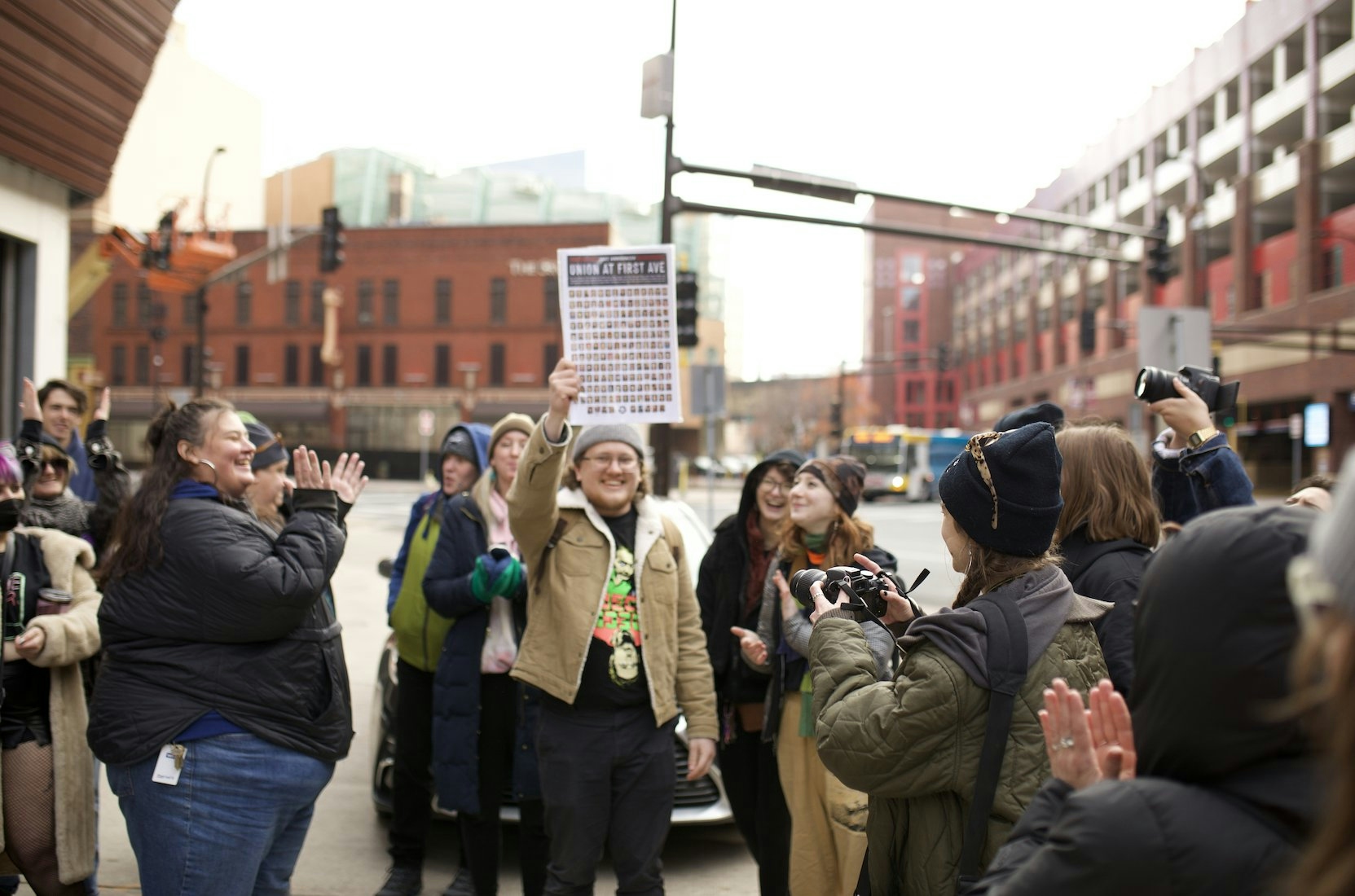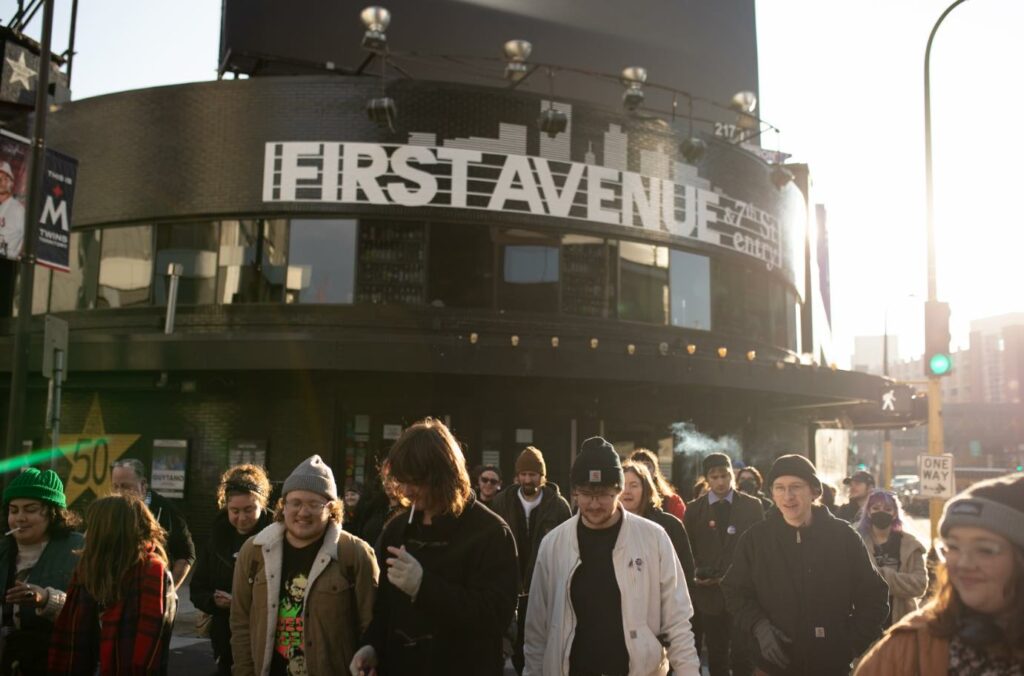
Victory! ROC/UNITE HERE Partnership Paves the Way for Workers to Form a Union at Seven Twin Cities Music Venues
November 20th, 2023
After years of preparation, it all happened so quickly.
On Thursday afternoon, a delegation of workers from the venues owned by First Avenue Productions met with management to say that they and 74% of their co-workers were committed to unionizing. On Friday, the company announced they would voluntarily accept the union and enter contract negotiations. Carefully laid plans for a campaign to pressure First Ave to come to the table were shelved, replaced by victory celebrations and prepping to begin the bargaining process.
It was the Confluence-supported partnership between worker center Restaurant Opportunities Center of Minnesota and UNITE HERE Local 17 (the restaurant and hospitality workers union) that laid the foundation for this victory.
“First Avenue workers came to ROC about 2 years ago because of issues they were having,” explains ROC MN Organizing Director Sheli Stein. As a worker center focused on an industry known for low wages, irregular schedules, and high turnover, the organizers at ROC have developed a flexible toolkit for workers to draw from to create change in their workplaces. “It’s a process of educating them on their rights, including their right to form a union, and also learning how power functions in their industry and in the broader economy, and teaching them the skills to have these same conversations with their coworkers.”
In 2021, when ROC first connected with the First Avenue workers, ROC and Local 17 were already in an exploratory partnership, after coming together in the early days of the COVID-19 pandemic. With restaurant and event venues shut down, hospitality workers around the Twin Cities, including the First Avenue workers, were furloughed and left without income. ROC and Local 17 teamed up to create an unprecedented Hospitality Relief Fund that distributed aid to union and nonunion workers alike.
As the lockdown phase of the pandemic ended, ROC and Local 17 began looking ahead, exploring how they could build on the relationship they’d developed through working together on the relief fund. As staffers from the two organizations analyzed shared industry research and compared theories of change, the number of First Avenue workers coming to ROC’s meetings continued to grow. Eventually it became clear that this should be the focus of this union/worker center collaboration.
First Avenue Productions is a large, high profile player in the Twin Cities music scene: the company owns the Turf Club, the Fitzgerald Theater, the Palace Theater, the Fine Line, the Depot Tavern, and the 7th Street Entry, as well as the iconic First Avenue, where Prince often performed and where parts of his 1984 film Purple Rain were shot. Many First Avenue workers who came to ROC talked about struggling to get by but not wanting to leave the industry. Workers who came back after the pandemic furlough were paid minimum wage, regardless of experience. Schedules were inconsistent and shared as little as four days in advance, making it impossible for workers to plan ahead.
“We love our jobs, but they haven’t been loving us back. So it’s time for that to change,” is how one member of the worker delegation summed it up shortly before the group went to meet with First Avenue management to declare their intention to form a union.
“We built a platform for worker power where there was none,” says ROC’s Sheli Stein. Power-building among workers left out of the union movement is the reason worker centers like ROC first developed. Most worker center organizers would agree that a union remains the gold standard when it comes to workers building and wielding power together. But because an array of barriers keeps unionization effectively out of reach for workers in many low-wage sectors, worker center campaigns have focused on worker education, public policy changes, and better enforcement of existing laws.
With First Avenue, all the elements were in place for workers to unionize: a committed group of workers, an image-conscious employer that controls a significant slice of the industry, and a strong relationship between a worker center and a union. Now that the union has been recognized, these workers will work with Local 17 staff to prepare for bargaining their first contract. Labor law is clear that contract negotiation with employers is the territory of unions, not worker centers, so ROC will not be involved in the negotiations with First Avenue management but instead will continue to engage with the First Avenue workers as it has before.
“ROC is about movement-building,” Stein explains. “And movements need many institutions playing many specific roles. One of ROC’s roles is as a convener: bringing workers together with other workers, with unions, with policymakers, and to prepare workers to show up powerfully in these relationships and achieve bigger and bigger wins, in the workplace and beyond. These First Avenue workers will use the skillset they learned through ROC to have influence within their union and in their community, to organize on policy issues as tenants, as students, as consumers.”
Workers Confluence will continue to support this and other union/worker center partnerships through grantmaking, technical assistance, and creating spaces where unions and worker centers can share information, build trust, and dream big together. We look forward to sharing the lessons learned through the winning partnership between ROC and Local 17 and catalyzing more bold and innovative worker power-building collaborations.
Share